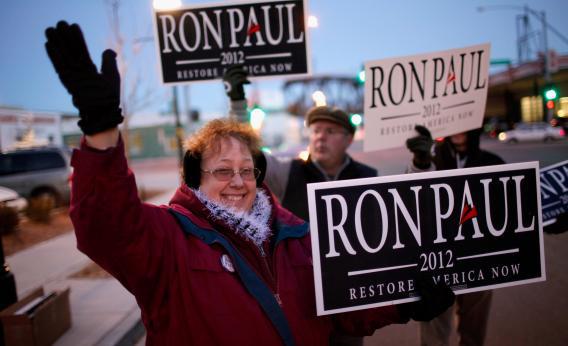Last week, I quietly harrumphed about this big New York Times take-out on Ron Paul’s old extremist ties, reminding readers that Julian Sanchez and I reported a lot of this stuff first. Sanchez, who’s now at the Cato Institute, hits the Grey Lady a little harder. He has a good reason.
The implication [of the NYT story] is that even though the newsletters were a focus of national attention four years ago, Paul’s fellow travelers were content to gloss over this ugly history—quietly complicit in this pandering to racism—until the bold bloodhounds at the Times sniffed out the scoop. It looks rather different if the Times is just rehashing the highlights of what a libertarian magazine explored in greater details years ago.
Yep, it changes the story. This is the Age of Agregation, and I don’t think every reporter covering Paul needs to follow James Kirchick to university libraries or follow me to local D.C. libertarians’ houses to dig through newsletter and Libertarian Party document files. But if you’re going to tell history, tell history. The offending part of the NYT story (which had two reporters and two researchers) comes at the nut grafs.
The libertarian movement in American politics has long had two overlapping but distinct strains. One, backed to some degree by wealthy interests, is focused largely on economic freedom and dedicated to reducing taxes and regulation through smaller government. The other is more focused on personal liberty and constraints on government built into the Constitution, which at its extreme has helped fuel militant antigovernment sentiment.
Mr. Paul has operated at the nexus of the two, often espousing positions at odds with most of the Republican Party but assembling a diverse and loyal following attracted by his adherence to libertarian principles.
Reading this, and not being familiar with libertarian kremlinology, you do get the sense that libertarians have ignored Paul’s old alliances with extremists. You have no idea that the controversy about this stuff goes all the way back to 1988, with added intensity since 2008. If you read to the penultimate paragraph, well, then you learn that a conversation between Paul and Cato’s Ed Crane* about the power of extremist mailing lists “was first reported in the libertarian publication Reason.” When? Well, in 2008, when the magazine pissed off a lot of libertarian fans of Paul by following up the newsletter story. Defenders of Paul blasted Reason and Cato as part of the “orange line mafia” (a reference to a D.C. metro line you can use to travel between George Mason University and Cato, sort of, but not really over to Reason) and the “Kochtopus” (a reference to donations of David and Charles Koch, which the rest of the media didn’t care about until 2010). The newsletter-investigators were defenders of a status quo, cowards, de facto warmongers. (I remember some Reason critics repeating “rumors” that the magazine would dump Brian Doherty, our brilliant historian of the libertarian movement. Not only did Brian stick around, he’s working on a new book about Paul.)
This changed after 2008. Barack Obama became president, disappointing libertarians on all sides of the Paul conversation. The Tea Party movement, stoked by the “wealthy interests” strain – the hated “Kochtopus” – became the most visible, powerful anti-tax movement in a generation. Rand Paul, Ron’s son, launched a bid for U.S. Senate, and the two strains were as enthusiastic about him as they were about his dad. (A 2011 Reason cover labeled Rand “the most interesting man in the Senate.”)
Again, this is all kremlinology, and if Paul wasn’t set to make history in Republican primaries, nobody would care. But it’s relevant to a story about Paul “operating at the nexus” of the free market movement.
*Sanchez worked for Cato before this article was written, and subsequently rejoined it, but wasn’t working for Cato at the time.
